Text
ancient greek word of the day: κακοθερής (kakotherēs), unfitted to endure summer heat
312K notes
·
View notes
Text
*I Want It That Way - Backstreet Boys comes on*
Me:

121K notes
·
View notes
Text
Swedish words desperately needed in the English language #11
Orka
When I use Google translate it says that it’s “to be able to” or “cope” but I think that orka isn’t exclusively one or the other. Orka means to have the energy, the mental strength, or general care to do something. This word is something I’ve missed living abroad as sometimes I might not be physically tired but feeling drained or just not up to something, this word would be an acceptable way of saying that, instead of perhaps “I’m not feeling it” which feels a bit rude.
“Did you want to go to the gym tonight?”
“We’ll see if I orkar”
181 notes
·
View notes
Note
hello! i'm only starting to learn japanese and i'm finding it hard to know where i should start with the kanji. do you really have to learn kanji separately and memorize both their pronunciations or can you just learn the kanji in the vocabulary?
omg no! don’t stress yourself out like that anon!!
okay, i’m going to be real with the japanese language learning community: you all are doing waaaaaaaay too much when it comes to kanji.
there. i said it.
learning kanji does not have to be a headache!
i spent the first 6 months of my japanese learning “career” (for lack of a better word) trying to figure out the best way to learn kanji because every website and book was like “here’s the kunyomi, here’s the onyomi, now learn them both” but the fine print of that learning method says “you’re going to f*cking struggle”
but then i started realizing that kanji i read all of the time, i didn’t even “properly” study like those articles said. i didn’t know the kunyomi and onyomi for 行 for ages, but i knew it was read いく in 行く and こう in words like 旅行 and 直行. because i learned those words in context and on their own.
a few months after i came to japan, i started asking japanese people how they learned kanji and every single one of them answered the same way: they learn through vocabulary. i once asked my boyfriend how he learned kanji in grade school, and he said that they were basically given a kanji, and then they were given a list of vocabulary that included that kanji. they then memorized the vocabulary and grew to know the kunyomi and onyomi readings.
which, spoiler: kunyomi and onyomi is not always an accurate measure. lots of compounds use the kunyomi, some of them add dakuten (as in ちゅうごく instead of ちゅうこく in 中国), and others add っ (as in ちょっこう instead of ちょこう in 直行). this really isn’t something you can just magically guess.
but it’s important to remember that everyone learns differently. i don’t learn individual kanji – i learn kanji within various vocabulary words. i make sure to get as much exposure to the various ways a single kanji can appear within a larger compound, so 高 is not just a single kanji, but it is 高い and 高校生 and 高価.
i do, however, think it’s important to understand the meaning of a kanji. this can help you decipher the meaning of a word you don’t know yet. for example, 高価 (こうか) means “high price.” 高 means high and 価 means price. knowing their meaning individually can help decipher the meaning.
in this way you can argue that yes, knowing the individual readings of these two kanji makes guessing the reading of this word easier, but 価 can also be read “ke"! you can’t guarantee an accurate reading all of the time, but with more and more exposure to individual kanji, you will be able to tell.
which brings me to my main point: learning kanji is an individual experience. i, personally, think that learning onyomi and kunyomi readings for 2,000+ jouyou kanji is a HUGE WASTE OF TIME, but there are a lot of people out there that do this methodically and know lots and lots of kanji and vocabulary. i, personally, need kanji in a larger vocabulary word in order for it to stick, and my brain just catalogues the various readings away. that’s how my brain works and learns, but it’s not how everyone else works and learns.
it’s important to find what works for you.
that being said, if you’re just starting out i highly recommend Jakka. it’s a website meant for japanese grade school teachers and has tons of grade school kanji material broken up into their appropriate grades. japanese school children are expected to learn and master a certain amount of kanji + vocabulary each grade level, so if you’d really like to learn like a child, learn like the school children do! (the website is in japanese but fairly simple to navigate.)
i hope this helps a little anon! and remember that learning kanji isn’t a race. if it takes you awhile to learn them, don’t worry. everyone learns languages differently.
2K notes
·
View notes
Photo

updated to Crown levels in Duolingo and all my gold levels are now empty 😩😩 now my perfectionist self is going to spend a ridiculous amount of time making them all gold again.
1 note
·
View note
Text
me: *looking at children’s books in the language im studying*
me: *understands 3 words in a single sentence*
me: I CAN READ!!!!!!!!!!
25K notes
·
View notes
Photo

Comparing Two Things in Japanese
A is more X. than B. (X = adjective) AはBよりXです。
The dog is cuter than the cat. 犬は猫よりかわいいです。 (いぬ は ねこ より かわいい です)
This bag is lighter than that bag. この鞄はその鞄より軽いです。 (この かばん は その かばん より かるい です)
Between A and B which one is more X? AとBとどちらがXですか。
Between China and Japan, which is bigger? 中国と日本とどちらが大きいですか。 (ちゅうこく と にほん と どちら が おおきい です か)
China is bigger than Japan. 中国は日本より大きいです。
A is more X. Aの方がXです。(のほうが)
China is bigger. 中国の方が大きいです。 (ちゅうこく の ほう が おおきい です)
Both are (equally) X. どうちらもXです。
Between cats and dogs, which are cuter? 猫と犬とどうちらがかわいいですか。 (��こ と いぬ と どうちら が かわいい です か)
Both are cute. どうちらもかわいいです。
2K notes
·
View notes
Text
Japanese for travellers, pt. 2.
Here we are with the second part of “Japanese for travellers”, enjoy!
01. Do you understand? || ¿Entiende?
わかりましたか。|| wakari mashitaka?
02. Yes, i understand || Sí, entiendo.
はい、わかりました。|| hai, wakarimashita.
03. No, i don’t understand || No, no entiendo.
いいえ、わかりません。|| iie, wakarimasen.
04. I speak a little || Hablo un poco.
すこしはなせます。|| sukoshi hanase masu.
05. How do you pronounce this? || ¿Cómo se pronuncia esto?
これはどうはつおんしますか。|| kore wa dō hatsuonshi masuka?
06. What’s the meaning of “….”? || ¿Qué significa “….”?
『….』はどうゆういみですか。|| “…” wa dō yū imi desu ka?
07. Can you write it, please? || ¿Podría escribirlo, por favor?
かいてくれませんか。|| kaite kuremasen ka?
08. Can you repeat, please? || ¿Podría repetirlo, por favor?
くりかえしてくれませんか。|| kurikaeshite kuremasen ka?
09. Can you speak slowly, please? || ¿Podría hablar más despacio, por favor?
もっとゆっくりはなしてくれませんか。|| motto yukkuri hanashite kuremasen ka?
971 notes
·
View notes
Text
Japanese Music Vocabulary ・音楽についての単語
I re-watched my favorite anime, Nodame Cantabile. The feels and obsession are real, like the heaps of music-themed vocabulary I learned from it! Here you are! EVERYONE, WATCH NODAME CANTABILE, I AM SERIOUS! (のだめカンタービレ)
「楽しい音楽の時間だ」
The nice thing about music vocabulary is that there are some Kanji that keep appearing again and again, making the words easier to remember (the readings)
General Stuff
音楽・おんがく・music
弾く・ひく・to play (an instrument)
楽器・がっき・Instrument
楽譜・がくふ・sheet music
クラシック・classical music
演奏・えんそう・performance
演奏旅行・えんそうりょこう・tour
手中・しゅちゅう・concentration
奏法・そうほう・way of performing, playing
公演・こうえん・performance
Some instruments
ピアノ・piano
バイオリン・violin
オボエ・oboe
ティンパニ・tinpani
ファゴット・fagott
トランペット・trumpet
フルート・flute
ギター・guitar
チェロ・cello
コントラバス・contrabass
ビオラ・viola
ピッコロ・piccolo
ドラム・drum
マンドリン・mandolin
Compositions
作曲・さっきょく・composition (also a する verb)
楽曲・がっきょく・composition
器楽曲・きがくきょく・instrumental piece
練習曲・れんしゅうきょく・étude
交響曲・こうきょうきょく・symphony
協奏曲・きょうそうきょく・concerto (eg. ピアノ協奏曲 piano concerto)
狂奏曲・きょうそうきょく(yes, the same as in concerto)・rhapsody
曲名・きょくめい・title
Artists and Ensembles
音楽家・おんがくか・musician
奏者・そうしゃ・player, musician
指揮者・しきしゃ・conductor
デュエット・duet
室内楽・しつないがく・chamber music
オーケストラ・orchestra
Music Theory
音楽理論・おんがくりろん・music theory
器楽・きがく・instrumental
長調・ちょうちょう・major key
短調・たんちょう・minor key
和音・わおん・accord
協和音・きょうわおん・consonant accord
不協和音・ふきょうわおん・dissonant accord
小節・こぶし・measure
音符・おんぷ・note
休符・きゅうふ・rest, pause (playing)
絶対音感・ぜったいおんかん・perfect pitch
楽想・がくそう・theme
作品・さくひん・opus number (e.g. 作品18 - op. 18)
楽章・がくしょう・movement (e.g. 第1楽章 - first movement)
2K notes
·
View notes
Text
Emoji in Japanese

Valentines is coming, let’s translate sweets!!
🍡(Dango) 団子 🍦(Ice Cream) アイスクリーム 🍧(Shaved Ice) かき氷 🍩(Doughnut) ドーナツ 🍪(Cookie) クッキー 🎂(Cake) ケーキ 🍰(Shortcake) ショートケーキ 🍫(Chocolate) チョコレート 🍬(Candy) お菓子 🍭(Lollipop) ロリポップ 🍮(Pudding) プリン 🍯(Honey) 蜂蜜(はちみつ)
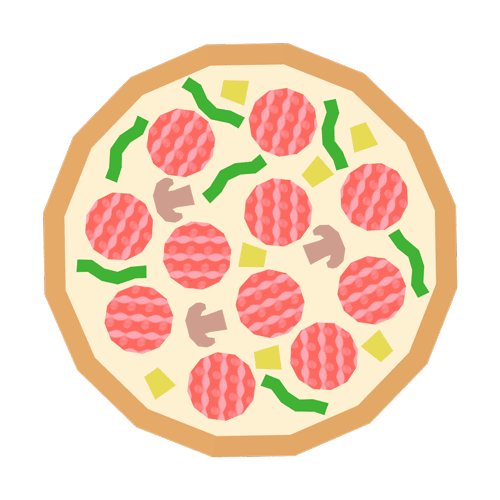
Let’s go all the way and translate all the food emojis!!
🍇(Grapes) 葡萄(ぶとう) 🍈(Melon) メロン 🍉(Watermelon) 西瓜(すいか) 🍊(Tangerine) タンジエリン 🍋(Lemon) レモン 🍌(Banana) バナナ 🍍(Pineapple) プイナップル 🍎(Apple) りんご 🍐(Pear) 梨の未(なしのみ) 🍑(Peach) 桃(もも) 🍒(Cherry) チェリー 🍓(Strawberry) いちご 🍅(Tomato) トマト 🍆(Eggplant) 茄子(なす) 🌽(Corn) 玉蜀黍(とおもろこし) 🍄(Mushroom) 茸(きのこ) 🍞(Bread) パン 🍖(Meat) 肉(にく) 🍗(Chicken) 鶏(にわとり) 🍔(Hamburger) ハンバーガー 🍟(French Fries) フレンチポテト 🍕(Pizza) ピザパイ 🍳(Cooking) 料理 (りょうり) 🍲(Hotpot) 鍋(なべ) 🍱(Bento Box) 弁当(べんとう) 🍘(Rice Cracker) 煎餅(せんべい) 🍙(Rice Ball) おにぎり 🍚(Rice) ご飯(ごはん) 🍛(Curry Rice) かれー 🍜(Ramen) ラメン 🍝(Spaghetti) スパゲテイ 🍠(Sweet Potato) 焼き芋(やきいも) 🍢(Barbeque) おでん 🍣(Sushi) すし 🍤(Fried Shrimp) 天ぷら(てんぷら) 🍥(Fish Cake) なると//しんじょ ☕(Coffee) コーヒー 🍵(Tea) お茶(おちゃ) 🍶(Sake) 酒(さけ) 🍷(Wine) ワイン 🍸(Cocktail) カクテル 🍹(Tropical) トロピカルドリンク 🍺(Beer) ベール 🍻(Cheers) 乾杯(かんぱい)
2K notes
·
View notes
Text
Satori Reader ~ A new project by the team that brought us Human Japanese (°◡°♡)

Morning fam! Because I am a huge throbbing nerd for the Human Japanese series and use it every other day for routine study, their latest project - Satori Reader - was brought to my immediate attention.
Screenshots have been taken of the website’s free content to give you a peek into what is on offer. I’m giving it a trial run for the moment, but my fingers are itching to subscribe - something I can do at any point with relative ease.

For anyone who is floundering in the grey waters of intermediate study, and especially for those whose study is self perpetuated, there’s a good chance you’re looking for some sort of landmark in that churning mess to orient yourself by. A metaphorical island, with sparkling shoreline, verdant forest, and plentiful resources to help you grow and flourish.
I’m talking content. As many bloggers have mentioned, there is a plethora of material out there to help us learn the framework and mechanics of 日本語. It’s not at all difficult to source grammar lessons, vocabulary lists, kanji writing schematics, charts and even entire textbooks - and for that we are eternally thankful. However, the intermediate learner sitting at their own dining room table with an open laptop, a cup of tea, the latest anime OST on repeat and a Japanese novel in their quivering hands is leafing through the pages and quietly mouthing how in the everliving f**k…
This is where SR gently takes your hand and says, here’s how, you foulmouthed otaku.

This is an excerpt from a level 3 difficulty article about Kona the cat (可愛いね)
Like every other article available on the website, it is voiced over by a native speaker, clearly and naturally - with all the intonation you would expect to hear in conversation *heavy breathing* Not only that, but as the audio plays, the corresponding Japanese text is underlined in blue to show where in the text they are reading from. This means that if you are proficient enough, you can follow along at pace.
Too slow? They got you fam! Individual lines of text are divided into sound bytes, meaning you can take this task one sentence at a time.
Individual kanji, jukugo (several kanji that make up one word) and particles within the text can also be clicked to reveal a Human Japanese style dictionary entry. Words you’d like to revisit can be added to your studylist.

The symbol marking the end of each sentence, when clicked, offers you an english transliteration, which I advise you utilise with a degree of self control. Try to hold off clicking it until you’ve really given the sentence a go - clicking on kanji you don’t recognise and piecing all the information together in order to get an idea of what’s being said. Then, when you finally check the translation, your hard work might be rewarded with a confirmation that you indeed read correctly. Which, by psychology standards, is a healthy and affirming process. We are hardwired for rewards my dudes!
I could go into detail about the many little features that make this web project so well thought out and considerate of our individual study methods and goals, but I’ll leave that to you to explore and find out. For me at least, the true worth of SR lies mainly in the reading content and the empathetic format it’s presented in.
The way it Aladdin style reaches out, offering us a whole new world.
Give the free subscription a whirl! If you like it, consider a paid subscription. This directly funds future content which directly benefits you!
~ Thanks Human Japanese team ~
Update (╯✧▽✧)╯
After giving SR a good go and fully testing its arsenal of functions, I realised my initial review bordered on plain lazy. This update is going to give you warm prickles because it turns out that one of the features included in the Review section of SR is an integrated flash card program with full Anki support *prayer hands emoji*

This means that whatever vocabulary you add to your studylist automatically generates a flashcard that you can either review within the SR website, or via your Anki software. Here’s an example:

Straight away, SR gives you an edge in your revision by implementing context. In fact, as well as offering you the sentence you saved the word from, it offers you a link to the entire article it was taken from (see: REVEAL IN FULL ORIGINAL CONTEXT)
This is incredibly helpful, as dictionary entries for any word or phrase you select often include a specific explanation about how that word is being used within the context of the sentence or how it is being used by the narrator to portray his or her story.

I hope that this extra glimpse into the Review section of Satori Reader gives you an idea of how incredible a resource this is.
Go ahead and enjoy the unique pleasurable pain that is reading and comprehending 日本語!!
4K notes
·
View notes
Text
🌷 Asking for help with your Japanese, in Japanese 🌷
A hodgepodge of useful phrases I’ve collected that come in handy for language-exchange or tutoring with native speakers.
日本語で「 」って何と言うんですか にほんごで「 」ってなんというんですか。 How do you say “ “ in Japanese?
「a」は「c」と言う意味ですか。 「a」は「c」といういみですか。 Does “a” means “c”?
私の言っていることが分かりますか。 わたしのいっていることがわかりますか。 Do I make sense?
私が言おうとしていることが分かりますか? わたしがいおうとしていることがわかりますか? Do you understand what I’m trying to say?
これのもっと良い言い方があれば教えてください。 これのもっといいいいかたがあればおしえてください。 If there is a better way to say this, please tell me how.
「 」っていう表現は自然ですか? 「 」っていうひょうげんはしぜんですか? Does “ ” sound natural?
この言葉はこの文章に合いますか。 このことばはこのぶんしょうにあいますか。 Does this word work in this sentence?
日本語を添削してください。 にほんごをてんさくしてください。 Please correct my Japanese.
とてもわかりやすい説明をありがとうございます。 とてもわかりやすいせつめいをありがとうございます。 Thanks for the very easy-to-understand explanation
とても詳しい説明をありがとうございます。 とてもくわしいせつめいをありがとうございます。 Thanks for the very detailed explanation.
入力ミスを指摘してくれてありがとうございます。 にゅうりょくミスをしてきしてくれてありがとうございます。 Thanks for pointing out my typo(s).
添削してくれてありがとうございます。 てんさくしてくれてあ���がとうございます。 Thanks for correcting (that) for me.
勉強になりました。 べんきょうになりました。 (That) was educational/I learned a lot
助かりました。 たすかりました。 (That) was helpful.
If any of these is wrong, iffy, or could be phrased better, don’t hesitate to point it out!
3K notes
·
View notes
Text
N5 verb list
会う (あう)- to meet
開く (あく)- to become open
開ける (あける)- to open
上げる (あげる)- to give
遊ぶ (あそぶ)- to play, to make a visit
あびる - to bathe, to shower
洗う (あらう)- to wash
ある - to be, to have (inanimate)
歩く (あるく)- to walk
言う (いう)- to say
行く (いく)- to go
居る (いる)- to be, to have (animate)
要る (いる)- to need
入れる (いれる)- to put in
歌う (うたう)- to sing
生まれる (うまれる)- to be born
売る (うる)- to sell
起きる (おきる)- to get up
置く (おく)- to put
教える (おしえる)- to teach, to tell
押す (おす)- to push, to stamp
覚える (おぼえる)- to remember
泳ぐ (およぐ)- to swim
降りる (おりる)- to get off, to descend
終わる (おわる)- to finish
買う (かう)- to buy
返す (かえす)- to return something
帰る (かえる)- to return, to go back
かかる - to take time or money
書く (かく)- to write
かける - to call by phone
貸す (かす)- to lend
借りる (かりる)- to borrow
消える (きえる)- to disappear
聞く (きく)- to hear, to listen, to ask
切る (きる)- to cut
着る (きる)- to put on
曇る (くもる)- to become cloudy/dim
来る (くる)- to come
消す (けす)- to erase, to turn off
答える (こたえる)- to answer
コピーする - to copy
困る (こまる)- to be worried
咲く (さく)- to bloom
差す (さす)- to stretch out, to raise
散歩する (さんぽする)- to stroll
死ね (しね)- to die
閉まる (しまる)- to close, to be closed
閉める (しめる)- to close something
締める (しめる)- to tie
知る (しる)- to know
吸う (すう)- to smoke
住む (すむ)- to live in
する - to do
座る (すわる)- to sit
掃除する (そうじする)- to clean, to sweep
出す (だす)- to put out
立つ (たつ)- to stand
頼む (たのむ)- to ask
食べる (たべる)- to eat
違う (ちがう)- to differ
使う (つかう)- to use
疲れる (つかれる)- to get tired
着く (つく)- to arrive at
作る (つくる)-to make
つける - to turn on
勤める (つとめる)- to work for someone
出かける (でかける)- to go out
できる - to be able to
出る (でる)- to leave, to go out
取る (とる)- to take something
撮る (とる)- to take a photo or film
鳴く (なく)- to chirp, roar, croak etc
無くす (なくす)- to lose something
習う (ならう)- to learn
並ぶ (ならぶ)- to line up, to stand in line
並べる (ならべる)- to line up, to set up
なる - to become
脱ぐ (ぬぐ)- to take off clothes
寝る (ねる)- to sleep, to go to bed
登る (のぼる)- to climb
飲む (のむ)- to drink
乗る (のる)- to ride, to get on
入る (はいる)- to enter, to contain
はく - to wear, to put on trousers
始まる (はじまる)- to begin
走る (はしる)- to run
働く (はたらく)- to work
話す (はなす)- to speak
貼る (はる)- to stick
晴れる (はれる)- to be sunny
引く (ひく)- to pull
弾く (ひく)- to play an instrument
吹く (ふく)- to blow (wind)
降る (ふる)- to fall (rain, snow)
勉強する (べんきょうする)- to study
曲がる (まがる)- to turn, to bend
待つ (まつ)- to wait
磨く (みがく)- to brush teeth, to polish
見せる (みせる)- to show
見る (みる)- to see, to watch, to look
持つ (もつ)- to hold
休む (やすむ)- to rest
やる - to do
行く (ゆく)- to go
呼ぶ (よぶ)- to call out, to invite
読む (よむ)- to read
練習する (れんしゅうする)- to practice
分かる (わかる)- to be understood
忘れる (わすれる)- to forget
渡す (わたす)- to hand over
渡る (わたる)- to go across
6K notes
·
View notes
Photo
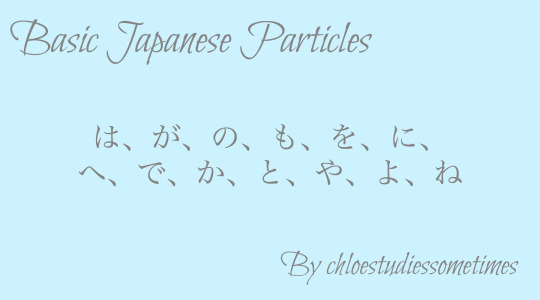
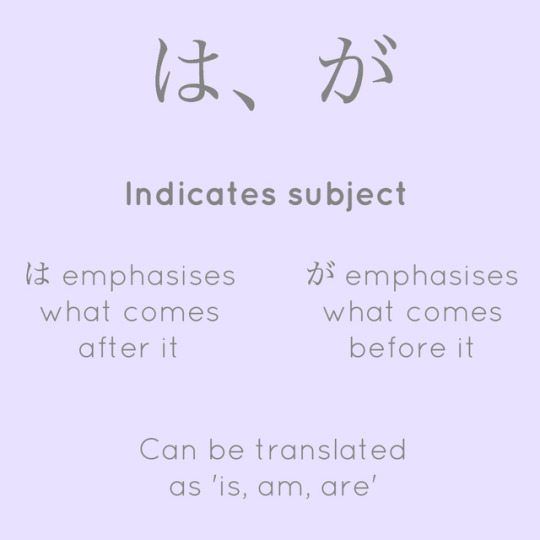

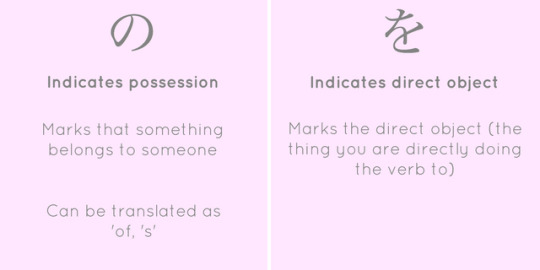
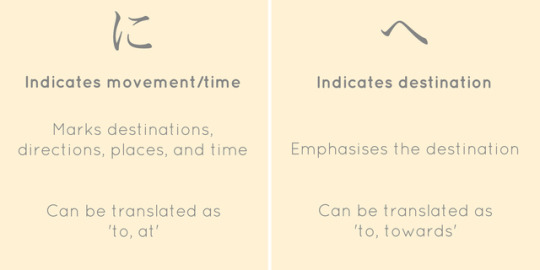
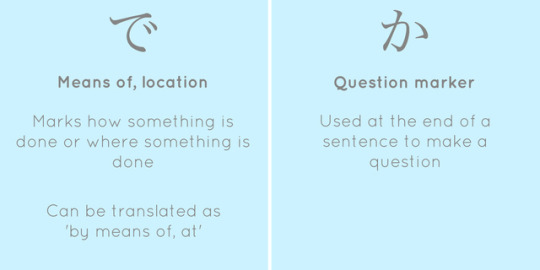

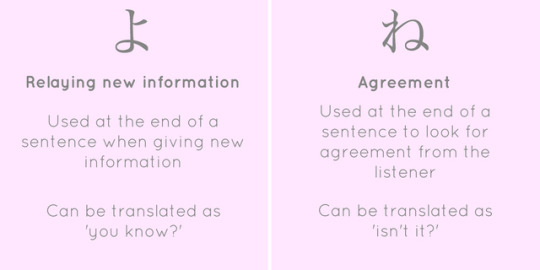
I’ve been meaning to make this post for a while, and I got an anon the other day asking about particles and a request from someone to make this post, so here it is! A list of basic particles and their usage! I hope this can help anyone struggling with particles and how to use them, but if I have made any mistakes please let me know ^^ (also please don’t remove my caption!)
15K notes
·
View notes

